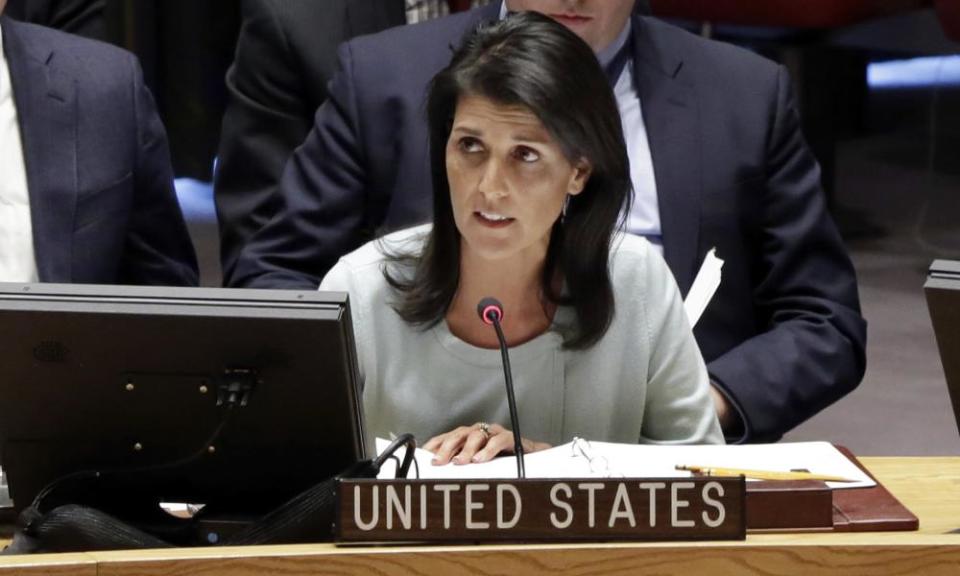Negotiations to ban nuclear weapons begin, but Australia joins US boycott

Negotiations on a treaty to outlaw nuclear weapons have begun in New York, but have been publicly condemned by the United States, which is leading a coalition of more than 40 countries – including Australia – boycotting the talks.
At least 113 countries are part of the negotiations which have begun at UN headquarters in New York this week, aiming to negotiate a “legally binding instrument to prohibit nuclear weapons, leading towards their total elimination”.
But, Nikki Haley, appointed as the United States’ ambassador to the UN by Donald Trump in January, spoke outside the meeting saying the world was too unsafe for the US not to have nuclear weapons.
“I’m a mum. I’m a wife. I’m a daughter. I always think of my family first. Our job is to protect our people and our country. To keep them safe. To keep the peace.”
“We would love to have a ban on nuclear weapons but in this day and time we cannot honestly say that we can protect our people by allowing the bad actors to have them and those of us who are good trying to keep the peace and safety not to have them.”
France and the UK, fellow nuclear weapons states, also spoke against the ban treaty negotiations, saying they would not assist in disarming nuclear states.
Support for a ban treaty has been growing steadily over years, with frustration at the ineffectiveness of the nuclear non-proliferation treaty in reducing nuclear arsenals. More than 123 nations - the majority of nations at the UN - voted in favour of negotiations to outlaw nuclear weapons.
But a ban treaty has no support from the states that actually have nuclear weapons. The nine known nuclear states – the US, China, France, Britain, Russia, India, Pakistan, Israel and North Korea – all oppose a ban treaty.

Of the non-nuclear states opposing the ban treaty, Australia has been one of the most outspoken.
During months of negotiations, Australia has lobbied other countries, pressing the case for what it describes as a “building blocks” approach of engaging with nuclear powers to reduce the global stockpile of 15,000 weapons.
Australia has consistently maintained that as long as nuclear weapons exist, it must rely on the American nuclear umbrella, the protection of the deterrent effect of the US’s nuclear arsenal, the second largest in the world.
But political sentiment in Australia appears to support the ban treaty negotiations.
The Australian Senate passed a motion Monday urging the government to participate in the talks, and polling shows nearly three-quarters of Australians want Australia to be part of negotiations on a nuclear weapons ban treaty.
The Senate on Monday passed a motion urging the Australian government to “participate constructively” in the ban treaty talks.
The motion, moved by Labor Senator Lisa Singh, argued Australia had a moral and legal obligation to participate in efforts to ban nuclear weapons, the only weapon of mass destruction not outlawed under international law.
“There are close to 15,000 nuclear weapons in the world today, posing a grave threat to all humanity,” Singh’s motion said.
“Australia as a party to the non-proliferation treaty, is legally required to pursue negotiations in good faith for nuclear disarmament.”
In response, assistant minister to the prime minister, Senator James McGrath, told the Senate “Australia shares with the international community the goal of a peaceful and secure world free on nuclear weapons”, but that it would not be participating in the UN talks.
“This approach is consistent with Australia’s clear and long-standing position on the proposed nuclear weapons ban treaty.
“The proposed ban treaty would not advance nuclear disarmament. It will be ineffective in eliminating, or even reducing, nuclear weapons arsenals. It will not advance security… and it risks undermining the nuclear non-proliferation treaty by creating ambiguity and confusion through parallel obligations and by deepening divisions between nuclear and non-nuclear weapons states.”
An Ipsos poll conducted this month of 1050 Australians asked: “The UN will begin negotiations this month on a new treaty to prohibit nuclear weapons. Should the Australian Government support these negotiations?”
In all, 73% of respondents answered yes, 10.6% no, and 15.5% maybe.
The outreach coordinator for the International Campaign to Abolish Nuclear Weapons, Gem Romuld, said existing treaties – such as the nuclear non-proliferation treaty – had failed to reduce nuclear arsenals, and that Australia should embrace the new plan of action to rid the world of the weapons.
“The ban negotiations are modelled on comparable bans on chemical and biological weapons and landmines. This is a timely and historic opportunity to make nuclear weapons illegal along with the other weapons of mass destruction”.
“Boycotting the ban talks flies in the face of Australia’s international obligations and casts doubt on our commitment to the UN. Australia must choose the right side of history and join the ban negotiations without delay”.
The efficacy of a ban treaty is a matter of fierce debate.
Without the participation of the states that actually possess nuclear weapons, critics argue it cannot succeed. But proponents say a nuclear weapons ban will create moral suasion – in the vein of the cluster and landmine conventions – for nuclear weapons states to disarm, and establish an international norm prohibiting nuclear weapons’ development, possession and use.
Non-nuclear states have expressed increasing frustration with the current nuclear regime and the sclerotic movement towards disarmament.
With nuclear weapons states modernising and in some cases increasing their arsenals, instead of discarding them, more states are becoming disenchanted with the nuclear non-proliferation treaty and lending their support for an outright ban.

 Yahoo News
Yahoo News 
